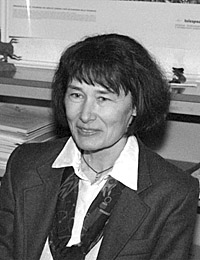


Mme Katalin Torok, botaniste hongroise, a été le premier chercheur d'Europe centrale et orientale à participer au Programme d'experts invités des établissements universitaires et instituts de recherche. Elle a accepté un engagement de huit mois à la FAO en qualité de coordinatrice du Programme pour l'Europe centrale et orientale du Système mondial d'observation terrestre (SMOT), qui est établi au sein du Bureau sous-régional de la FAO à Budapest.
Mme Torok a dirigé un projet conçu pour mettre en place un programme régional SMOT capable de produire des données pouvant être utilisées pour des études sur le changement mondial de l'environnement. Les activités d'observation et de surveillance de l'environnement, menées dans les quatre pays de la région, ont été examinées en détail et utilisées pour concevoir une stratégie régionale et un plan d'exécution pouvant donner lieu à des méthodes d'évaluation harmonisées.
La botánica húngara Katalin Torok, fue el primer experto investigador de Europa central y oriental que participó en el Programa de la FAO para expertos visitantes de instituciones académicas y de investigación. Esta experta llevó a cabo una misión de ocho meses en la FAO como coordinadora del sistema mundial de observación terrestre que forma parte del Programa de Europa central y oriental, con base en la Oficina Subregional de la FAO en Budapest.
La Dra. Torok dirigió un proyecto destinado a establecer un programa regional de dicho sistema que produciría datos e información para emplearlos en estudios sobre el cambio del medio ambiente mundial. Las actividades de observación y seguimiento del medio ambiente en cuatro países de la región fueron objeto de examen detallado y sirvieron para organizar un plan regional de estrategia y ejecución sobre métodos armonizados de evaluación y observación.
![]()
Hungarian botanist Katalin Torok was the first researcher from Central and Eastern Europe to participate in FAO's Programme for Visiting Experts from Academic and Research Institutions. She undertook an eight-month assignment with FAO as coordinator of the Central and Eastern Europe Programme of the Global Terrestrial Observing System (GTOS), based in the FAO Subregional Office in Budapest.
Torok led a project aimed at establishing a regional GTOS programme

Katalin Torok |
GTOS was created in January 1996 as a response to the widespread concern voiced at the 1992 Earth Summit over the long-term sustainability of the planet, given the ever intensifying human pressures on its natural resources and atmosphere. The central mission of GTOS is to provide policy-makers, resource managers and researchers with the data they need to detect, quantify, locate and monitor terrestrial ecosystems and their capacity to support sustainable development and improvements in human welfare. It focuses on five global environmental issues: changes in land quality; availability of freshwater resources; loss of biological diversity; climate change; and the impact of pollution and toxicity. GTOS is sponsored by FAO, the United Nations Educational, Scientific and Cultural Organization (UNESCO), the United Nations Environment Programme (UNEP), the World Meteorological Organization (WMO) and the International Council of Science Unions (ICSU).
Crucial environmental and economic linkages exist among countries, as international conventions on biological diversity, climate change and desertification have highlighted in recent years. GTOS promotes the exchange of data and information through a global system of terrestrial observation networks (GT-Net) that can generate the information needed to understand the magnitude and effects of regional and global change.
The Central and Eastern European (CEE) region faces several major environmental challenges, including high levels of industrial pollution and environmental pressure arising from intensive agricultural activities. The effects of these problems fall directly within the five global environmental issues of GTOS. The CEE programme of GTOS helps countries to strengthen their capacity for systematic environmental observation and assessment of terrestrial ecosystems. It also seeks to strengthen the institutional linkages needed to coordinate efforts at the regional level.
The CEE programme piloted by Torok is divided into three phases: identification of user needs concerning environmental information; assessment of the existing terrestrial observations; and formulation of a strategy and an action plan for integrating these activities in the region. Key partners in carrying out the work have been the United Kingdom's Institute of Terrestrial Ecology (NoLimits project) and the International Long-Term Ecological Research programme (ILTER).
To help identify environmental data requirements, a questionnaire was sent to 250 targeted government officials and scientists. The preliminary results from this survey show that more information is required concerning issues such as loss of biological diversity. In this respect, the elaboration of national monitoring strategies and programmes represents the main challenge. In the second phase of the programme, four countries (Hungary, Poland, the Czech Republic and Slovakia) were visited to review terrestrial ecosystem monitoring and determine particular needs in data and information management. Its purpose was to identify existing information networks in the region, to encourage data exchange between scientists and to establish the "state of the art" of terrestrial monitoring activities in the region. Data availability will then be matched against perceived user needs for each of the five global environmental issues of GTOS. National focal points were identified for these four countries. A desk study will review the state of terrestrial observation for the remaining Central and Eastern European countries.